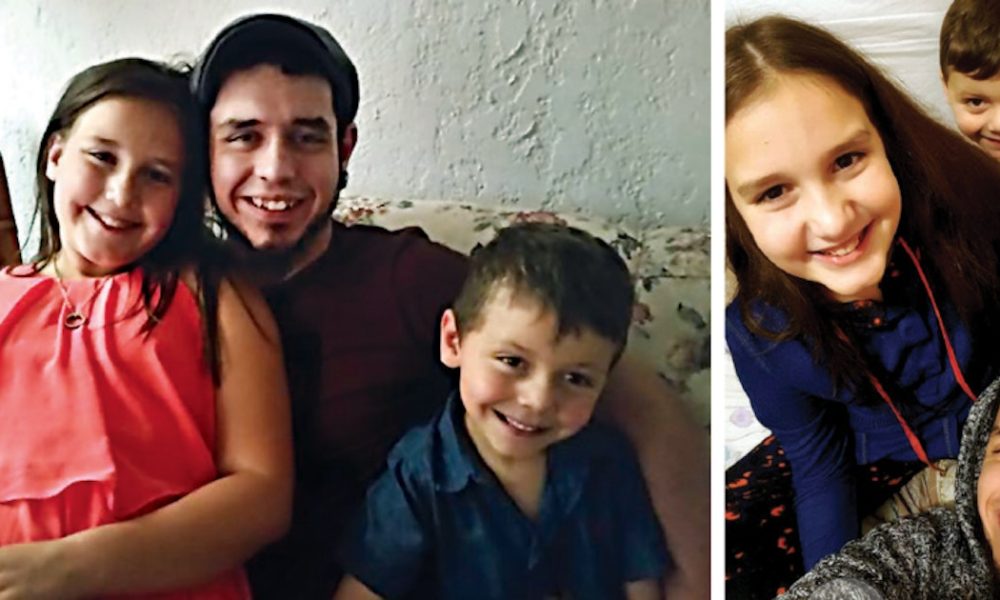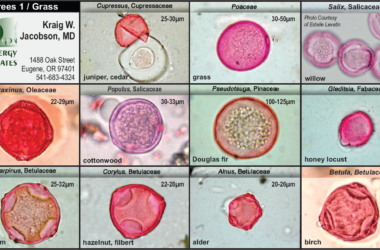 Aaron was 28 when he died by suicide in 2017. He left behind two children, Cora, 10, and Gabe, 6. PHOTO PROVIDED
Aaron was 28 when he died by suicide in 2017. He left behind two children, Cora, 10, and Gabe, 6. PHOTO PROVIDED
Editor’s note: This is the last in a four-part special collaboration between The Creswell Chronicle, The Cottage Grove Sentinel, Siuslaw News and Newport News-Times focusing on the rising suicide rate in Oregon. Each week in April, the four newspapers in this collaboration contributed a part to the series and published them together. The hope is that, by sharing our resources and readerships, we can begin establishing a dialogue within each of our communities about this important subject.
Aaron was 28 when he died by suicide in May 2017, leaving behind two kids, Cora, 10, and Gabe, 6.
”I wish I knew how to describe how I feel,” he wrote in his final Facebook post. ”These past few weeks and days have left me feeling pretty (screwed) up mentally, emotionally and physically. I’m losing faith, but at the same time I’m not, because I believe thru my actions, along with my prayers, that God will provide. But I just wish things would get better, back on track, or at least be able to see some sort of light at the end of the tunnel…”
No one but Aaron knows what exactly transpired that night. A few things are known: His fiancé had just given her ring back. His room reeked of alcohol. He paused a game he was playing on his Xbox. He sent a text to his fiancé saying, ”tell my kids I love them and that I’m sorry.”
By the time she got the message, it was too late.
The kids are not alone. Between 7,000 and 12,000 children lose a parent to suicide each year in the United States.
BECOMING A FATHER, BATTLING HIS DEMONS
Ashley and Aaron met in high school and were together two years, when Ashley got pregnant at 17. They married in 2006 with their 2-month-old daughter, Cora, by their side. Aaron graduated from high school in 2007.
It wasn’t until they moved in together that Ashley recognized the gravity of Aaron’s issues. His intense mental and physical problems, coupled with a rough childhood, was a formula for depression. Aaron was moody with a ”mean streak.” He was epileptic and often forgot to take his medication, which caused serious seizures and severe insomnia.
The older he got, the more his conditions worsened. They were together for nine years, but the last four were really tough, Ashley said.
Still, they worked at it and welcomed a baby boy, Gabe, in 2010. Aaron would go to therapy, but wouldn’t stick with it. Their relationship became increasingly unhealthy, and they separated in 2011.
This was the first time Aaron attempted suicide. After a week-long stay in an institution, he began taking antidepressants and was instructed to see a therapist.
Following doctor’s orders, things seemed to get a bit sunnier. The couple got back together, but when he stopped going to therapy, he was noticeably in decline.
A couple months later, they were back to square one.
”He wanted to do good, but there was something going on in him where he just couldn’t get it together,” she said. She left again in 2012, for good this time.
In the years following, he drank heavily, struggled to keep a job, relied on the affection from girlfriends and became over-exercised, skinny and pale.
A couple weeks before Aaron died, his mom found him lying on the floor, cigarette in his mouth, wrists gushing. He was belligerent when he went into the emergency room after this second attempt. The nurse told them they had two options: to check in involuntarily for an undetermined amount of time, or sign himself in for 72 hours. He took the latter option, which was not in his best interest.
”There were definitely warning signs,” Ashley said.
TELLING THE KIDS
Many pleaded with Ashley to not tell her kids the details surrounding their father’s death. She initially told them their dad died from an epileptic seizure, but Cora knew better.
”I had a hunch something wasn’t right, that he didn’t die from a seizure,” Cora said, now 12. ”It was like my dad was whispering it in my ear.”
Cora was already seeing a therapist and happened to have an appointment scheduled that day. Ashley was advised by Cora’s therapist that when the truth is withheld from the child about a parent’s suicide, it sets back their grieving process; when they find out the truth later in life, the child will grieve the death a second time.
Ashley decided to break the news to Cora in a therapy session that day.
”I just couldn’t grasp it,” Cora said. ”It didn’t seem real. I felt guilty; if I was there, I could have stopped it. I prayed for God to take all my limbs if I could have one more conversation with him. I already missed him, even though it just happened. ”
Ashley did not tell her son that his father died by suicide until he asked about it again a week after his death.
”It was a hard conversation to have with the baby, but my therapist said that if the kids have questions, to answer them honestly,” Ashley said. ”It was the first time ever where I felt like I wasn’t talking to a little boy anymore.”
‘A DIFFERENT KIND OF GRIEF’
Gabe, now 8, still talks about his dad a lot. He draws broken hearts and portraits of himself crying. He mentions how his dad would have liked a plaid shirt he sees, or would’ve enjoyed the movie he’s watching. He sometimes says he’s angry or sad when remembers his dad, and said they would always be together.
Cora has had nightmares in which her dad announces he is leaving them, where she follows him and watches him kill himself in the woods.
”I also dreamt my dad got an awful disease and he would just die on us, or that he would just literally leave us one night and never come back,” Cora recalls.
When Aaron died, there was less than a month left of school before summer break.
”Every single day I could not focus and would literally get sick to my stomach,” Cora said. When school let out, ”I was at home all day and lost in my thoughts. When I would hold it in, I would get super sad; when I would talk about it, I would explode. All my sadness turned into anger. It overpowered everything.”
One day that summer, a sobbing Cora stopped her mom before leaving the house.
”I want to tell you something, but don’t want you to be upset,” Cora said. ”I think I’m suicidal. I want to be with my dad.”
It was the scariest thing Ashley had ever heard her daughter say. ”For (Cora) to be in that much pain at 11 years old, to hear her talk like that,” was horrifying and heartbreaking, Ashley said. ”Suicide is such a different kind of grief.”
Losing a parent to suicide makes children three times more likely to die by suicide themselves, and also increases their risk of developing a range of major psychiatric disorders, according researchers at Johns Hopkins Children’s Center.
Research also shows that a child’s resilience in a supporting, loving environment, and with careful attention to psychiatric symptoms, can offset a major stressor as a parent’s suicide.
Ashley and her partner, Shamarr, are determined to give Cora and Gabe all the support and help they can to avoid becoming part of that statistic.
But it’s not easy. Reminders are everywhere.
”Things happen – a song comes on, or I see or smell something – and I get upset; random things hit me that I don’t see coming. It is all in your face at one split-second,” Cora said.
The summer her dad died, Cora attended support groups and went to a bereavement camp, which helped significantly. Ashley and Shamarr are working to control Cora’s ”mean streak” – the same kind of personality disposition recognized in her dad. The kids are in therapy and Cora is on an antidepressant.
When Aaron ended his life, a new pain was left for his kids, his family and his loved ones, Ashley said. ”I really believe if he would have known how badly it affected the kids – he loved them the best he knew how – if he wasn’t drunk, he wouldn’t have done it.”
Eventually, ”I forgave my dad for what he did,” Cora said. ”Not that I can’t be mad at him; I just forgave him, but it took a while. Sometimes I still get mad at him and think about all the broken promises. But then I remember he was really sick… and I feel bad for him. It’s really mixed emotions but mostly I just love my dad and I wish I could see him.”
Cora remembers him fondly. She remembers driving around with him one day when she was younger. She wanted to color but didn’t have paper.
”I have this notebook, but you’re not allowed to look in it. Color on the back pages,” Aaron said. He told her that notebook would be her wedding gift someday.
That journal made its way to Cora after Aaron’s suicide. Inside are 15 letters he wrote to Cora while Ashley was pregnant, along with poems and lyrics he’d written to, for and about her.
It is the most special thing to her, just like she was the most special thing to him.
If only he could’ve given that notebook to Cora on her wedding day.
A CHANCE TO STAY
For every successful suicide, there are 25 attempts made, according to the American Association of Suicidology.
If we are serious about preventing suicide, we must learn from those who have experience with suicide, according to a report by the National Action Alliance for Suicide Prevention.
Adrian was 4 months old when his father, Eli Stockman, 38, of Creswell, attempted suicide.
”The people with the most intimate information about suicidal thoughts, feelings, and actions are those who have lived through such experiences,” the study reads. ”We all have an opportunity to learn from those with lived experience around suicide so we can do better in the future to foster hope and help people find meaning and purpose in life.”
Eli grew up on the poverty line, the second youngest of six children. He was sexually abused at a young age, was introverted and ridiculed, lost his father when he was 18, all the while being threaded through a string of unhealthy relationships.
People around him didn’t understand why it took so much for him to be happy, why it was so hard for him to find peace. He was treating himself poorly and allowed others to do the same to him.
”I wasn’t setting boundaries with people, and then all of a sudden would be done with them,” he said. He remembers having nightmares about being stuck in a car seat in the back of a vehicle, with everyone else in his life behind the wheel.
”I finally hit a point where it was so stressful,” Eli said. ”I hit enough walls that I kind of lost my mind for a bit. The medication I was on didn’t help, I ignored my doctor’s orders,” he said, and he turned to substance abuse for relief.
”In a matter of two months, I managed to alienate 99 percent of the people that I love,” he said. His life continued to crumble.
Four months after Adrian was born, his wife moved out.
Five days after she left, at age 34, Eli attempted suicide.
”All I could think about was a way out,” he said. ”It wasn’t personal against anyone I knew. I felt awful about it, especially having a new baby. That is horrible. I would never want to do that to (my son), but the desire to do it was so strong.”
He began taking his antidepressants, one by one, chasing them down with alcohol.
”All I know is that I hadn’t felt a greater sense of peace knowing that I had finally made the decision to let this all go … at first,” he said. ”I just felt like it was the right thing to do. I thought, ‘My son will be better off without me. All I’m going to do is disappoint him. I’m just going to be one of those dads.’ ”
About 20 pills later, he was laying on the floor in his living room, lights dimming, ready to pass out.
But in a flicker of a moment, before it was too late, he realized he still had a choice.
”I stopped for a second … I knew my dad was there with me,” Eli remembered. ”And he said to me, ‘I understand why you’re doing what you’re doing, but it’s not any easier on this side, and it’s going to be a lot more fun watching your little boy grow up.’ ”
In the middle of his own overdose, he mustered the strength to make a phone call. When the ambulance arrived, Eli was curled up on the floor in the living room, wrapped up like a cocoon, in a sleeping bag.
Barely conscious, he heard footsteps as emergency personnel and police filed into his home.
When he came out of his stupor in the hospital and was coherent enough to realize where he was, he was upset. Irrational, he thought about stealing a doctor’s coat and trying to walk out the door. He didn’t let on that he wanted out because the hospital would have kept him longer. Eli spent 48 hours in intensive care, followed by three days in the psychiatric ward.
At first, he was defensive about his suicide attempt, he said, ”but after a while I was like, ‘I can’t believe I did that.’”
In the midst of all his emotions after his suicide attempt, however, the desire to die got stronger.
”But I had already made up my mind to stay,” Eli said.
After the first attempt, it gets that much easier to attempt suicide again.
In the months after his first attempt, Eli visited the emergency room about seven times for suicidal ideation.
According to studies, non-fatal self-harm is one of the most frequent reasons for emergency hospital admission and the strongest risk factor for subsequent suicide.
When thoughts of suicide would overwhelm him, he called himself on it. ”If I saw that it was getting close, I would call for medical transport,” he said. He was fighting himself, but was determined to stay.
After all, he had a little baby that needed him.
Eli served as the main caretaker for his son and a stay-at-home dad for three years after his attempt. It helped him break through mental barriers by taking care of a child and focusing on something outside of himself.
”If I was just taking care of myself, I’d just be staring out the same mental window, which is a bad one,” he said. ”It was really good for me, especially after all of that.”
It’s a process to find clarity, to decide to stay. ”You really have to want it,” he said. That determination to stay has since been backed with more than 300 hours of therapy in the past four years, and endless conscious efforts toward bettering both his mental and physical health.
”(My son is) the reason I stick around, but I also have to figure out how to do it for myself because you can’t put that on someone else,” Eli said. ”I want to be here for myself. I want to live my purpose, keep my boundaries with people and figure out how to be happy and have a good time by myself.”
Eli deals by ”living his purpose,” which for him, is being a musician. ”Everyone has a passion, something that is nagging at them,” he said. He’s been playing guitar since he was 11, and has written three albums that he’s working on getting published.
He would also enter daily affirmations in a journal. Journaling ”would force me to focus on (gratitude,) because I wasn’t (grateful); I was just focused on all the crap that was going wrong, all of the stuff I wanted to fix,” Eli said. He wasn’t giving himself credit for the things he did right, for the things that were good in his life.
”Gratitude is huge,” he added. ”Even if it feels forced, it’s worth forcing.”
Facing his demons also has helped him significantly. ”It’s so painful, but so important,” he said.
And on especially bad days, sometimes all you can do is find something healthy to do to get yourself through the day, he said. It will get easier.
”I’ve come a really long way and I’m proud of myself,” Eli said. ”So much of my attention and my life has been under this theme of getting better. I’ve learned to be more kind to myself, more patient with myself.”
But it doesn’t change the fact that it’s a lot of work to hang on.
”I’m serious about staying,” he said with the assuredness that, eventually, things do get better.







